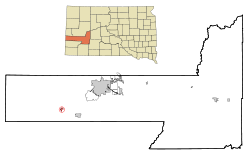Hill City, South Dakota
| Hill City | |
|---|---|
| City | |
| Hill City, South Dakota | |
| Motto: The Heart of the Hills | |
 Location in Pennington County and the state of South Dakota |
|
| Coordinates: 43°56′1″N 103°34′17″W / 43.93361°N 103.57139°WCoordinates: 43°56′1″N 103°34′17″W / 43.93361°N 103.57139°W | |
| Country | United States |
| State | South Dakota |
| County | Pennington |
| Established | 1876 |
| Incorporated | 1945 |
| Government | |
| • Type | Mayor-Council |
| • Council President | Dave Gray |
| Area | |
| • Total | 1.27 sq mi (3.29 km2) |
| • Land | 1.26 sq mi (3.26 km2) |
| • Water | 0.01 sq mi (0.03 km2) |
| Elevation | 5,159 ft (1,572 m) |
| Population (2010) | |
| • Total | 948 |
| • Estimate (2015) | 995 |
| • Density | 752.4/sq mi (290.5/km2) |
| Time zone | MST (UTC-7) |
| • Summer (DST) | MDT (UTC-6) |
| Zip Code | 57745 |
| Area code(s) | 605, NXX Exchange 574 |
| FIPS code | 46-29100 |
| GNIS feature ID | 1267029 |
| Website | City of Hill City |
Hill City is the oldest existing city in Pennington County, South Dakota, United States. The population was 948 at the 2010 census. Hill City is located 26 miles (42 km) southwest of Rapid City on State Highway 16 and on U.S. Route 385 that connects Deadwood to Hot Springs. Hill City is known as the "Heart of the Hills" which is derived from its close proximity to both the geographical center of the Black Hills, and the local tourist destinations.
The city has its roots in the Black Hills mining rush of the late 19th century. Tin mining was dominant in the 1880s and led to an influx of capital and people into the area. As the mining industry subsequently waned, tourism and timber became increasingly important to the area. With the establishment of Mount Rushmore in the 1940s, Custer State Park, and the Sturgis Motorcycle Rally, the Black Hills became known as a tourist destination which Hill City benefited from. In recent years the city has diversified to become a center for the arts in the area featuring several art studios and festivals.
Human history in the area that became Hill City, and the greater Black Hills in particular, started by at least 7000 BC. The Arikara arrived by 1500 AD, followed by the Cheyenne, Crow, Kiowa and Pawnee. In the 19th century, the Lakota Sioux claimed the land, calling it Paha Sapa. In 1874, Major General George Armstrong Custer led an expedition into the Black Hills, during which gold was discovered in French Creek, 13 miles (21 km) south of Hill City. The discovery of gold opened the Black Hills, and the Hill City area, to mining. Hill City was first settled by miners in 1876, who referred to the area as Hillyo. This was the second American settlement in the Black Hills. Hill City is the oldest city still in existence in Pennington County. A post office was constructed and opened on November 26, 1877. The city almost became a ghost town when miners relocated to the northern Black Hills after the discovery of gold there.
...
Wikipedia
